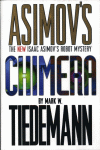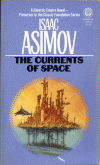
Chimera opens up with a flashback to twenty-five years ago to the scene kidnapping of twenty babies from a hospice center. Back at present day, Coren Lanra, security chief for Rega Looms at DyNan Corporation, is working on tracking the actions of Rega’s daughter Nyom. Unfortunately, Nyom ends up dead along with all those she was attempting to help smuggle to the settler colony Nova Levis. The only possible clue lies in the brain of a robot that locked up while trying to save the passengers. Surprisingly, Ariel and Derec are encouraged to help Coren in his investigation by Ambassador Setaris Coren is forced to follow his own leads while Derec attempts to recover the failed robot’s memories. The following investigation eventually reveals the link to the kidnappings, with danger at almost every turn.
Overall, I would say that this second book has a much more complicated set of plot lines than Mirage. I like the Coren Lanra character the best out of all the others in this series. He’s a man of integrity that does what needs to be done without worrying about the consequences to him. The technology he uses for his investigation is very interesting and seems to fit well into the time period. I can see how some of his little gadgets might actually exist some day considering the way nanotechnology is coming along. The gadgets seemed a bit more futuristic when this book was published in 2001. This book also seemed to focus a lot less on Three Law conflicts than Mirage. I would say that is a compliment because some times these “authorized” novels can sometimes focus on them to the point of being repetitive. Mark W. Tiedemann seems to realize that if someone is reading this they probably know the Three Laws inside and out already.
Further discussion of plot points: ***Note Possible spoilers for Chimera, The Naked sun, Robots and Empire, and Robot City series***
As stated in my previous review the Solarians are reclusive to the point that ANY human contact is repulsive. Tiedemann appears to try and cover for this with the following sentence, “To be sure, those Solarians living here did not share the degree of paranoia exhibited … but they still came across as standoffish and mistrustful.” (Chapter 8, pg 123) Also Coren remembers that Solarians have an “aversion to being touched” (Chapter 15, pg. 242) when the Solarian ambassador fails to shake his hand. Anyone that hasn’t read The Naked Sun might not realize that these statements are a bit of an understatement. Almost all Solarians are afraid to even see another in person, except for specified times to meet with their spouse. From what I remember Gladia was one of the few Solarians to leave and her willingness to “See” (in person) people was considered perverse.
Another problem is with Derec saying, “It’s the first place (Earth) I really came to know after I recovered from amnemonic plague (Burundi’s Fever). I may as well have been born here.” (Chapter 11, pg 178) From the Robot City novels the doctors on Earth were amazed with Derec because he had antibodies but had never actually had the disease. His hospitalization was due to the interference of the “chemfets” that were injected into Derec back on Robot City before he and Ariel escaped. His memory loss was later found to be caused by insane father, Dr. Avery, in an attempt to keep him from Ariel/Katherine.

